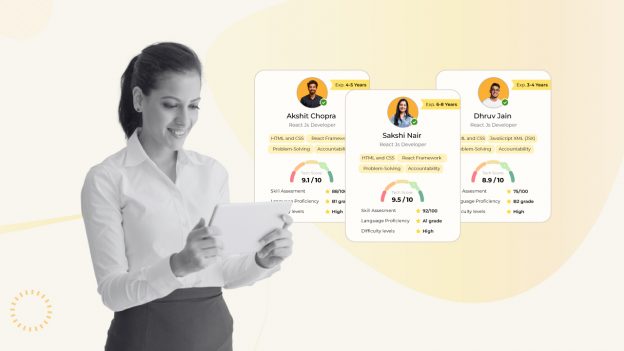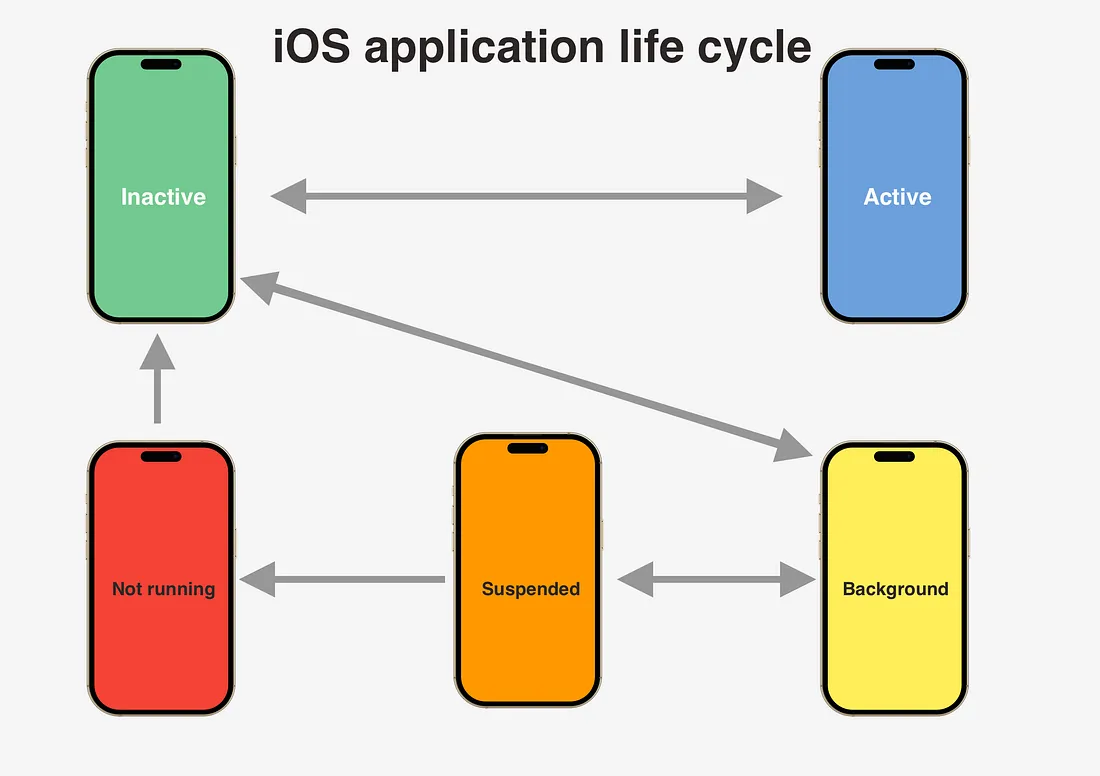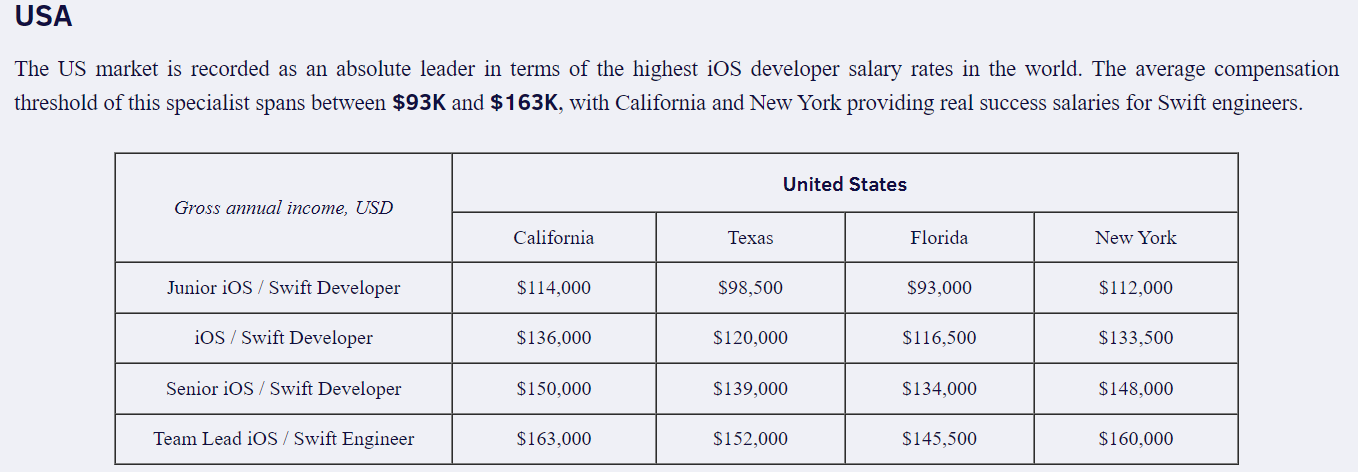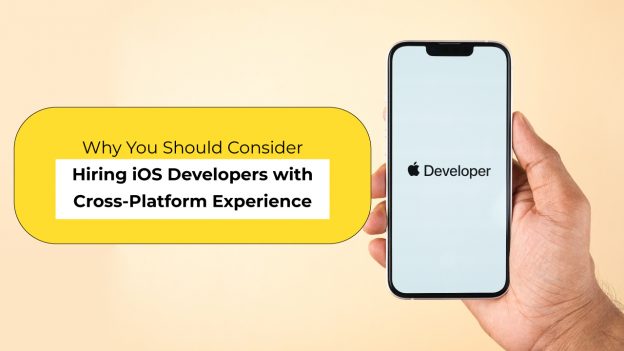iOS continues to dominate the high-end mobile marketspace with a user base that is more affluent and has a higher purchasing power. While Android has a large user base iOS users drive a significant 65% of the total app revenue. In this landscape Swift tops the chart as the language of choice for building fast, secure, and scalable applications on Apple platforms.
From startup MVPs to enterprise-grade applications, the demand for hiring swift developers has never been higher. The catch here is how to identify these qualified professionals, one with exceptional experience and two without going overboard with your budget. It goes far beyond resume screening for keywords or verifying Xcode proficiency. Swift is regarded to be a powerful language with a unique set of paradigms, memory management mechanisms, and architectural patterns.
If you are considering building a high-performing iOS team, your interview process needs to be equally sophisticated. In this blog we aim to do just that by outlining the top 10 essential questions that are designed to help you effectively hire Swift developers – not only for their technical finesse, but also for their architecture thinking, code quality, and mobile product mindset.
Why Interviewing Swift Developers Requires a Targeted Approach
To hire Swift developers is not the same thing as hiring generic programmers. The strong typing, protocol-oriented nature, and tight integration of Swift with the Apple ecosystem makes it unique. The best Swift engineers are ones who are not simply coders but architects that understand performance, design, and user experience at a deeper level.
Whether you are considering hiring iOS developers with Swift proficiency for a long-term project or on a freelancer basis for short-term app enhancements, these interview questions will lay the foundation for assessing practical knowledge, communication power, and product ownership.
Can You Explain the Differences Between Structs and Classes in Swift?
This question matters because it will help you test the developer’s understanding of value versus reference semantics – a groundwork concept in Swift.
What is it that you need to look for exactly?
- Structs are value types; classes are reference types
- Memory behavior differences
- Practical use cases (e.g., when to use structs for immutability)
You could also ask them to refactor a real-world class into a struct and state the trade-offs.
How Do You Handle Memory Management in Swift (ARC)?
Swift utilizes Automatic Reference Counting (ARC) and misinterpretation can result in memory leaks or costly app crashes.
What is it that you need to look for exactly?
- Knowledge of unowned, weak, and strong references.
- How to recognize and correct retention cycles, particularly when closures are involved.
- Familiarity with programs such as the memory graph debugger in Xcode Knowledge of unowned, weak, and strong references.
This becomes especially vital when you are hiring remotely or choosing to outsource via hiring platforms like Uplers that offer top AI-vetted talent that are expected to be productive from day one.
What Are Optionals and How Do You Use Them Safely?
Swift’s type safety revolves around optionals and mishandling could mean common crashes.
What is it that you need to look for exactly?
- Use of if let, guard let, and optional chaining.
- Avoiding force unwrapping (!).
- Knowledge of nil coalescing and optional binding in clean code.
This question will be an indication of whether they write resilient or crash-free apps – playing a crucial role in high-user volume environments.
How Do You Manage Asynchronous Code in Swift?
Almost every app interacts with APIs, databases, or sensors requiring async code.
What is it that you need to look for exactly?
- Familiarity with async/await (Swift 5.5+).
- Use of GCD (Grand Central Dispatch) or OperationQueues.
- Understanding of race conditions and thread safety.
It could be a bonus if you find candidates with an awareness of Combine or Swift Concurrency’s structured programming model. They can be regarded to be a step ahead in adapting to emerging trends in iOS development.
Can You Walk Us Through a Recent iOS App You’ve Built?
This open-ended question will provide you insights into their real-world experience, problem-solving approach, and end-to-end thinking.
What is it that you need to look for exactly?
- What problem the app solved
- Their role in the team
- Technical decisions (e.g., architecture, third-party libraries)
- Challenges and how they overcame them
This can be your chance to evaluate their ownership mindset and this can be crucial if you plan to hire mobile app developers for long-term product ownership.
How Do You Implement MVC/MVVM Architecture in Your Projects?
Clean architecture stands as a hallmark of scalable and testable apps.
What is it that you need to look for exactly?
- Possession of Model-View-Controller (MVC) and Model-View-ViewModel (MVVM) expertise.
- Knowledge of observers, delegation, and reactive bindings.
- Lucidity regarding modularity and worry separation.
Tip: Ask them to identify architectural improvements in a given code sample.
How Do You Approach Performance Optimization in Swift Apps?
App store ratings hinge on speed, memory utilization, and responsiveness to a great extent.
What is it that you need to look for exactly?
- Use of Instruments in Xcode for profiling
- Strategies like lazy loading, efficient table views, and caching
- Understanding of Core Data performance tuning
A developer who thinks about performance from day one is often likely to develop apps that scale.
How Do You Stay Up to Date with Swift and iOS Development Trends?
Swift and iOS both evolve rapidly and staying updated ensures that your app is competitive as well as maintainable.
What is it that you need to look for exactly?
- Subscriptions to WWDC sessions, iOS Dev Weekly, or RayWenderlich tutorials.
- Contributions to GitHub or Stack Overflow.
- Experimentation with SwiftUI, Combine, or Swift Concurrency.
When you hire Swift developers aligned with the advancement in trends and technologies, you ensure that your product keeps up with Apple’s fast-moving ecosystem.
How Do You Write Testable and Maintainable Swift Code?
Testability is vital for reliability, especially in complex app development.
What is it that you need to look for exactly?
- Knowledge of test-driven development (TDD) with XCTest.
- Utilizing dependency injection.
- Refactoring for improved modularity.
Ask them to state examples of bugs detected through testing or how they approach regression coverage before shipping.
How Do You Handle Third-Party Libraries and Dependency Management?
Most of the Swift projects rely on libraries and incorrect management can lead to version conflicts or bloated applications.
What is it that you need to look for exactly?
- Know how to use Carthage, CocoaPods, or Swift Package Manager.
- Describe how they check third-party libraries for security and upgrades.
- Recognize when to use external libraries versus building internally.
This reflects their engineering judgement along with attention to long-term stability.
Final Thoughts: Evaluating for Technical Skill and Product Mindset
To hire Swift developers is not merely about code quality, it’s more towards finding developers that think like product engineers. They must be considerate about performance, architecture, testing, and user experience in equal measure.
Whether it’s scaling your mobile team or building a new iOS product from scratch, these interview questions offer a robust framework for hiring experts who align with business and technical goals. More companies are turning to global talent strategies to overcome the skills gap and scale efficiently. Ask the right questions upfront if you want to set your team up for long-term success.






















